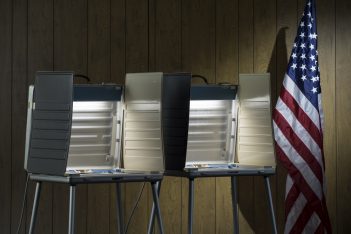 The presidential election polls are continuing to tighten in key battleground states. This has some Hillary Clinton supporters and #NeverTrump groups in Democratic strongholds like California concerned that third-party voters in battleground states may tip the election in favor of Donald Trump. So, some of these groups are now organizing “vote-trading” campaigns in key swing states to prevent third-party voters from hurting Clinton and potentially sending Trump to the White House.
The presidential election polls are continuing to tighten in key battleground states. This has some Hillary Clinton supporters and #NeverTrump groups in Democratic strongholds like California concerned that third-party voters in battleground states may tip the election in favor of Donald Trump. So, some of these groups are now organizing “vote-trading” campaigns in key swing states to prevent third-party voters from hurting Clinton and potentially sending Trump to the White House.
Here is how it works. We will get to if it’s legal next.
Committed supporters of a third-party candidate such as Gary Johnson who live in crucial swing state like North Carolina, Florida, or Ohio can go to websites like TrumpTraders.org where they can interact with Clinton supporters in safe Democratic states like California, New York, Washington, Oregon, etc. They can then agree to swap votes with the Clinton supporter. As the theory goes, this ensures that a vote is cast for the candidate they support, but it will be counted in state where there is far less risk of it potentially swinging the election in favor of Trump.
“By converting their supporters to choose between one of the only two real choices we have in this election, Jill Stein and Gary Johnson can help prevent what we’re all afraid of: a Donald Trump presidency,” John Stubbs, co-founder of Republicans for Clinton in 2016, told The Hill newspaper.
However, everything goes forward on the honor system after the “vote-trading” agreement is reached. With the secret ballot system, of course, there is no way to know for sure how any single person voted.
So, some readers might be wondering if this type of “vote-trading” scheme is legal.
The answer is, yes. It almost certainly is legal, at least according to the Ninth Circuit Court of Appeals opinion from 2007 in the case of Porter v. Bowen.
In the Porter case, the Ninth Circuit opinion addressed the legality of a similar “vote-trading” website set up in anticipation of the presidential election in 2000. The Court found both the website and the communication about “vote-trading” between users was protected under the First Amendment.
“At [its] core, [the vote-trading plan] amounted to efforts by politically engaged people to support their preferred candidates and to avoid election results that they feared would contravene the preferences of a majority of voters in closely contested states,” Judge Raymond C. Fisher wrote. “Whether or not one agrees with these voters’ tactics, such efforts, when conducted honestly and without money changing hands, are at the heart of the liberty safeguarded by the First Amendment.”
[image via Burlingham/shutterstock]